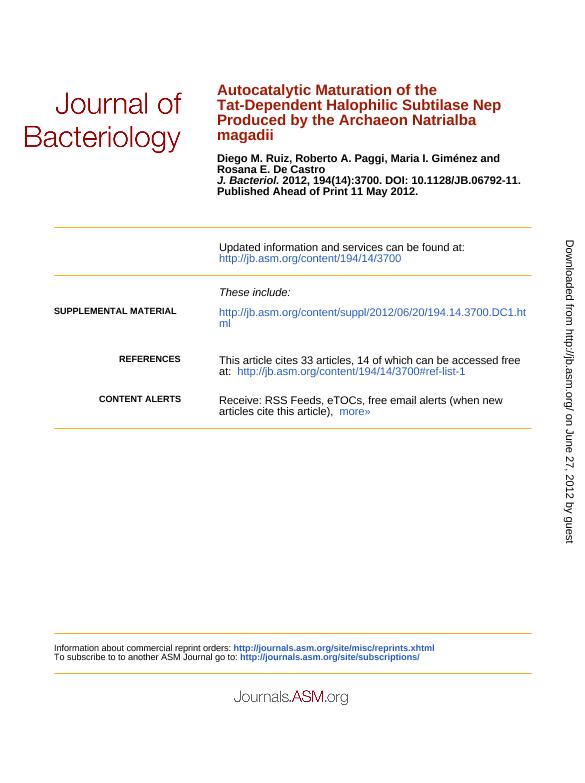Artículo
Autocatalytic maturation of the Tat-dependent halophilic subtilase Nep produced by the archaeon Natrialba magadii
Fecha de publicación:
07/2012
Editorial:
American Society For Microbiology
Revista:
Journal Of Bacteriology
ISSN:
0021-9193
e-ISSN:
1098-5530
Idioma:
Inglés
Tipo de recurso:
Artículo publicado
Clasificación temática:
Resumen
Halolysins are subtilisin-like extracellular proteases produced by haloarchaea that possess unique protein domains and are salt dependent for structural integrity and functionality. In contrast to bacterial subtilases, thematurationmechanismof halolysins has not been addressed. The halolysin Nep is secreted by the alkaliphilic haloarchaeon Natrialba magadii, and the recombinant active enzyme has been synthesized in Haloferax volcanii. Nep contains an N-terminal signal peptide with the typical Tat consensus motif (GRRSVL), an N-terminal propeptide, the protease domain, and a C-terminal domain. In this study, we used Nep as amodel protease to examine the secretion andmaturation of halolysins by using genetic and biochemical approaches.Mutant variants of Nep were constructed by site-directedmutagenesis and expressed in H. volcanii, which were then analyzed by protease activity andWestern blotting. The Tat dependence of Nep secretion was demonstrated in Nep RR/KK variants containing double lysine (KK) in place of the twin arginines (RR), in which Nep remained cell associated and the extracellular activity was undetectable. High-molecular-mass Nep polypeptides without protease activity were detected as cell associated and extracellularly in the Nep S/A variant, in which the catalytic serine 352 had been changed by alanine, indicating that Nep protease activity was needed for precursor processing and activation. Nep NSN 1-2 containing amodification in two potential cleavage sites for signal peptidase I (ASA) was not efficiently processed and activated. This study examined for the first time the secretion and maturation of a Tat-dependent halophilic subtilase.
Palabras clave:
Archaea
,
Protease
,
Tat System
Archivos asociados
Licencia
Identificadores
Colecciones
Articulos(IIB)
Articulos de INSTITUTO DE INVESTIGACIONES BIOLOGICAS
Articulos de INSTITUTO DE INVESTIGACIONES BIOLOGICAS
Citación
Ruiz, Diego M,; Paggi, Roberto Alejandro; Gimenez, Maria Ines; de Castro, Rosana Esther; Autocatalytic maturation of the Tat-dependent halophilic subtilase Nep produced by the archaeon Natrialba magadii; American Society For Microbiology; Journal Of Bacteriology; 194; 14; 7-2012; 3700-3707
Compartir
Altmétricas




